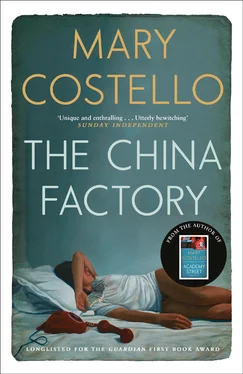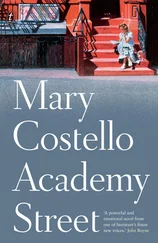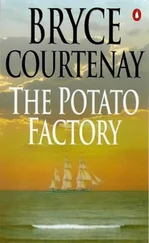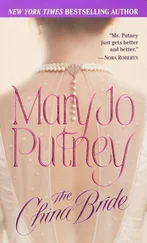Mary Costello - The China Factory
Здесь есть возможность читать онлайн «Mary Costello - The China Factory» весь текст электронной книги совершенно бесплатно (целиком полную версию без сокращений). В некоторых случаях можно слушать аудио, скачать через торрент в формате fb2 и присутствует краткое содержание. Год выпуска: 2015, Издательство: Canongate Books, Жанр: Современная проза, на английском языке. Описание произведения, (предисловие) а так же отзывы посетителей доступны на портале библиотеки ЛибКат.
- Название:The China Factory
- Автор:
- Издательство:Canongate Books
- Жанр:
- Год:2015
- ISBN:нет данных
- Рейтинг книги:5 / 5. Голосов: 1
-
Избранное:Добавить в избранное
- Отзывы:
-
Ваша оценка:
- 100
- 1
- 2
- 3
- 4
- 5
The China Factory: краткое содержание, описание и аннотация
Предлагаем к чтению аннотацию, описание, краткое содержание или предисловие (зависит от того, что написал сам автор книги «The China Factory»). Если вы не нашли необходимую информацию о книге — напишите в комментариях, мы постараемся отыскать её.
In these twelve haunting stories award-winning writer Mary Costello examines the passions and perils of everyday life with startling insight, casting a light into the darkest corners of the human heart.
The China Factory — читать онлайн бесплатно полную книгу (весь текст) целиком
Ниже представлен текст книги, разбитый по страницам. Система сохранения места последней прочитанной страницы, позволяет с удобством читать онлайн бесплатно книгу «The China Factory», без необходимости каждый раз заново искать на чём Вы остановились. Поставьте закладку, и сможете в любой момент перейти на страницу, на которой закончили чтение.
Интервал:
Закладка:
The next weekend with her gone off in the lad’s car again, the words boiled up in his brain, the leer, the glass in his hand as he swayed, the coat with the dirty sleeves. In the early hours the front door opened and he jumped out of bed and pounded along the landing and down the stairs. He raised his hand but could not bring it down on her, so he brought his fist down on the kitchen table instead. He was not to darken the door again, he roared. She turned white but he could not stop his pacing, his raging.
The lad was never mentioned again. She returned, still, at weekends and in the summer — a quieter girl, he thought, because everything has a price. After university she got a job in a city library, and then a few years later she went to Canada.
The quiet of the day is blown apart by a terrible bang, and he is startled. A flock of starlings rises out of the trees. He walks down the road towards Kelly’s yard, tracking the sound that’s still rolling in waves through the air. He meets Christy walking out of his yard. He is carrying a gun and raises it in salute.
‘Christy, are you all right?’
‘Never better.’
‘I thought I heard a shot.’
‘The fuckin’ cat knocked over the bucket of milk this time.’ He nods in satisfaction and walks on. ‘He won’t do it again, the bastard.’
He crosses Kelly’s yard, past the dairy and the open barn door. In the furthest corner the bucket is lying on its side in a pool of milk. Blobs of dirt float on its surface. He feels a chill on the back of his neck. He looks over the wall into the field. The cat’s corpse is lying on the grass five or six yards away. The head is flattened, the belly open with little twisted ropes of intestines and fur and blood. Flies are starting to swarm. He feels his legs grow weak, and the force of the bullet in his own middle. He moves his gaze to the paws, all four, tender, white. He closes his eyes for a second, lifts his face to the sun, as the bile begins to rise.
He is sitting on the low wall at the edge of the front lawn, waiting. A white butterfly lands on a flower. He had never noticed butterflies or flowers much before. His shoulders are tired. Out on the main road a heavy truck goes by. He tracks the sound of its engine as it passes the shop, the church, the graveyard. The sky darkens. A cloud gathers directly above him, and seems to hang there for a minute. It starts to mushroom out then. He has the feeling that it will lower itself down over him. His heart thumps faster. He feels some danger close by, as if the cloud has come to pester him or question him, and when he has no answers, it will press down on him and enclose him and smother him. He closes his eyes tight and then, for no reason, he turns his head and there among Marie’s red dahlias is the white butterfly. He watches its wings moving. He feels a little release, as if the cloud is lifting. For a second he is free. He feels some goodness, and that it is coming from the butterfly. He watches it flitting among the flowers. Then his breath catches and he thinks how something of Marie always revives him. He feels himself break. He should have talked to her more. He should have gone inside at night. He should have tried to coax her to California. He thinks of all the blindness he ever had.
Out on the main road, he hears the familiar sound of the Toyota slowing down. He sits up and waits for the engine to draw nearer, until he sees her head inside the car. She slows at the front gate. A look passes between them. A little piece of him, a lump of flesh or an organ, seems to break off inside and drift away. She drives into the car shed and switches off the ignition.
*
Soon she will lead him inside and in the kitchen she will tell him what he already knows. All day long they will move about the house with their separate thoughts. When the light fades they will sit in their chairs by the range. She will prompt him to retell a story from the past, and when he frowns and pauses halfway through she will reach down into his memory and pluck out the name or the date he has forgotten, and they will laugh and almost forget themselves. He will no longer be afraid to say things. When night comes they will lie down and he will tell her that she has never changed and that her blue-grey eyes remind him of a wolf’s. He will tell her that there was always some want in him and he is afraid of almost everything now. He will ask her to send for Miriam. He will remind her that the front of the graveyard gets waterlogged in winter, and to go well back towards the end. Pick a dry grave for me , he will say. Don’t bury me in water .
ROOM IN HER HEAD
Romy watched the Americans go down the lane. Bob carried the fishing rods and Susan walked beside him. She wore a yellow T-shirt and sunglasses in her hair. At the end of the lane they turned right onto the road in the direction of the lake, nearly a mile away. Romy looked at the mountains across the way. Just then a cloud covered the sun and shadows darkened the slopes. She saw the tiny figures of sheep grazing on slanted fields and imagined the sound of their faint plucking on the short grass. In winter the cold silver river sliced through the valley and the bare trees were silhouetted against the sky. She liked the stark beauty of winter. She thought about Bob and Susan for a while. Their absence left her feeling momentarily free.
She stood at the door and squinted into the dark interior. Michael was working on his laptop at the desk with his briefcase on the floor beside him. She wanted to speak, but something in the purposeful arrangement of his body deterred her. She brought a kitchen chair outside and sat against the white cottage wall and began to read.
Little things disturbed her; the strong sunlight on the page, children’s laughter on the next farm, the ticking of a baler nearby. A blackbird on a branch of the ash tree opened its beak in song. At times all the sounds gathered and melded into one. The sun burned the top of her head and when she touched her hair she thought the hot brittle strands might ignite, and her whole head catch fire. Her novel was set in a frozen northern landscape and the main character an intense silent man who loved his neighbour’s wife. Gradually she forgot herself and was drawn down into the book, into the man’s suffering, into the cold white place, until suddenly it struck again — the gathering, the concordant notes of the baler and the cries of children and birds — and she closed her eyes and she was neither in the frozen north nor in the man’s heart nor there burning up in the sun. She dropped her hand and touched the edge of the chair, relieved that it still contained her.
The cottage belonged to their American friends. Susan was an artist and professor in a university in the Midwest and Bob was a photojournalist. Romy had met Susan in a Dublin library a few years earlier, when Susan was experiencing a ‘creative crisis’. The American woman had hoped that an intense shift to literature, to the deliberateness of words and language, might help unleash the internal visual images that had backed up in her psyche. She believed the rhythm of words, of poetry especially, would release her, free her of her affliction. This was how Susan spoke. She was ten years older than Romy. Bob was her third husband. She told Romy that she had proposed to him three weeks after they met.
‘I popped the question and he looked at me for a moment and then he said, “Oh, I don’t think so, babe… I’d make a bad husband.” “That’s ok,” I told him, “I quite like bad husbands… I’ve had two. They amuse me.”’
Romy had stared at Susan, taking a moment too long to register the words.
‘Rosemary, honey, I’m kidding ! That’s a line!’
Bob was more boy than man, at times sluggish, other times volatile. He had fine Germanic features and blue eyes and straight blond hair. On their first trip to Ireland they found the cottage in the northwest and returned each summer. They converted the outhouses into a studio with white walls and a wooden floor and skylights in the roof. Every morning Susan donned an old shirt, and stood at her easel with her brushes and paint and her music swirling around her, composing and painting the large canvasses that shocked Romy with their derelict beauty. Limestone walls, ancient stone circles, blue-grey mountains and white suns, haunting portals and archways and always some mysterious figure at the edge — human or animal or bird — a lurking presence that made something flip over inside Romy and render her silent.
Читать дальшеИнтервал:
Закладка:
Похожие книги на «The China Factory»
Представляем Вашему вниманию похожие книги на «The China Factory» списком для выбора. Мы отобрали схожую по названию и смыслу литературу в надежде предоставить читателям больше вариантов отыскать новые, интересные, ещё непрочитанные произведения.
Обсуждение, отзывы о книге «The China Factory» и просто собственные мнения читателей. Оставьте ваши комментарии, напишите, что Вы думаете о произведении, его смысле или главных героях. Укажите что конкретно понравилось, а что нет, и почему Вы так считаете.












